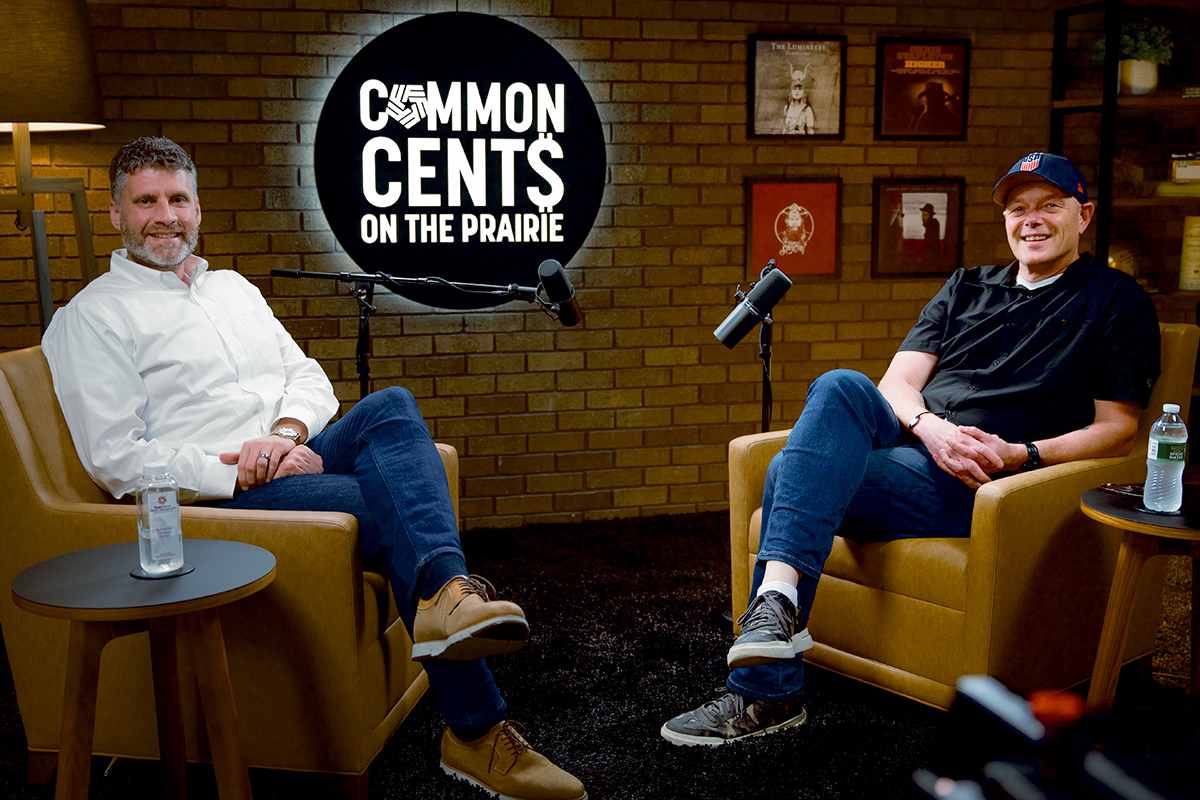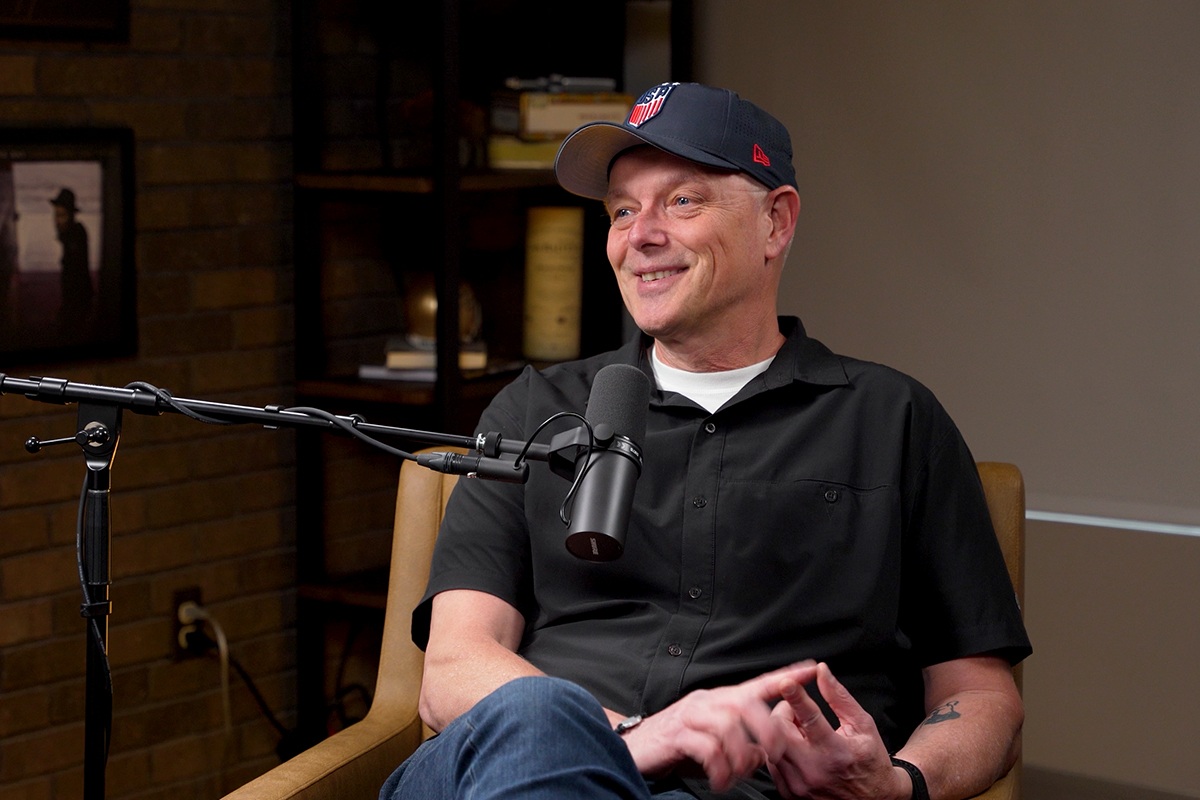Sioux Falls business founder, CEO Bob Simpson defines the true value of money
“Literally, I hung up the phone, and all of a sudden we had no money.”
When a life-altering, traumatic event plummeted Bob Simpson into poverty, his entire view on money shifted.
“I didn’t really think about money; it was just always there,” Bob said on an episode of our financial education podcast, Common Cents on the Prairie™. “I had this sense of security that really just got destroyed in 30 minutes.”

Bob Simpson (right) with host Adam Cox (left) on the Common Cents on the Prairie podcast.
Now the founder and CEO of the Multifamily Impact Council, Bob says he’s glad his life turned upside down because it made him who he is today.
“It made me a better person,” he said. “It took me a long time to kind of talk about it. Did I wish it didn’t happen? Yeah. But it happened, so I’m going to make it work.”
As he reflects back on the approximately 10 years he spent digging out of a negative net worth, Bob shares the crucial lessons he learned about the true value of money.
The middle-class experience
“My experience with money up until I was 19 years old is I did not know what it was,” said Bob, whose father controlled the finances in the family. “I had no idea. We never talked about it.”
His mother, a German immigrant who grew up in the middle of World War II, would grocery shop with only a blank check signed by Bob’s father.
“My dad wasn’t great with money,” Bob said.
He remembers his mom writing out the check for about $10 more than the grocery bill and pocketing the extra cash.
“I never really knew why,” Bob said. “…Later on, she said that she would keep that money because eventually a check would bounce.”
Despite his family’s lack of communication around money, they remained a middle class household and always had food on the table and gas in the car.
“I didn’t know how hard that was for my parents to…make that available until much later,” Bob said.
He started to understand during his freshman year of college, when the life-altering phone call came through.
“I suddenly realized that I had no relationship with money”
“Being just a typical, dumb college kid, I got a call from my dad,” Bob said.
He had been arrested, as Bob recalled, on 52 counts of federal tax fraud and sales tax fraud.
Bob remembers questioning his sense of identity, as well as how he would pay for the next semester of college.
“I think the most important thing that changed is I suddenly realized that I had no relationship with money,” Bob said. “And the sense of security that I thought I had was really built on a lie, right?”
He added, “Well, it wasn’t built on a lie; it was built on something that didn’t exist in the first place.”
Finding financial freedom
About a decade would pass before Bob brought his net worth back up to zero.
During that time, he learned a lot about who he was and what role money played in his life.
“I ended up getting a lot of jobs in college,” Bob said. One such job was working at a call center in Yankton.
“I love playing intramural softball, and I played for our (fraternity) house team,” Bob said, “and I couldn’t play my senior year because I had to go to this stupid call center job. And it was a soul-sucking job.”
There, he had a sort of epiphany about the correlation between work and money.
“I remember just sitting there and thinking, okay, I’m going to figure out a way to get enough financial security [and] make enough money where I can have a job where I can do what I want.”
He discovered that that didn’t mean making more money; it meant needing less things so you have more money left over.
“The more money you have left over at the end of the day means the more freedom you have to do what you want,” Bob said. “[It] means you’re probably going to have a better night’s sleep. And then, as I got older, it became, really, a pathway to making sure that my family could be secure.”

The true value of money
“Your value’s not based on what you have,” Bob said. “It’s not based on what you don’t have. Your value’s based on how much value you provide to the world.”
He added that it doesn’t matter if you drive an old, beat-up truck — or even if you drive a really nice truck. Your value is based on whether you do good things, are happy, are a good parent, and so on.
Some of his takeaways for finding value outside of money are to:
- Be critical about what is truly a “need” and what is simply a “want”
- Have a good relationship with money, but don’t overthink it
- Enjoy not having stuff
To that last point, he added, “I love to fish. I don’t own a boat. I love not having a boat. …The joy of fishing for me is sitting on the side of a lake, throwing a line in the water.”
And his final piece of advice: “Be a good person. That’s far more valuable than anything else.”
To hear more of Bob Simpson’s story, watch the full podcast episode at the player below. Or, you can listen on Apple Podcasts or your favorite streaming app.
If you’d like help from a financial expert on separating your wealth from your value, send a note to our team at First National Wealth Management. We’d be happy to have a conversation!
Any comments, insights, or strategies discussed in this article are intended to be general in nature and, therefore, may not be suitable for you and your situation, whatever that may be. Before acting on anything written here, please consult with your attorney, CPA, and/or your financial advisor.
Get some more Common Cents
Looking for more tips on building wealth? Browse episodes of our award-winning financial education podcast.
I Want In




